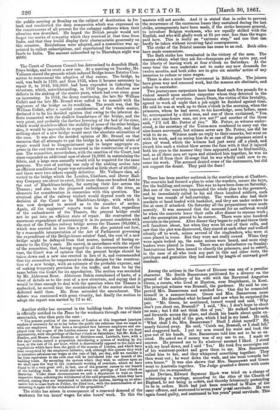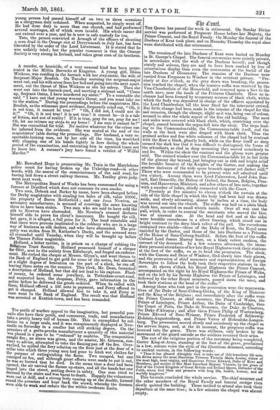Among the actions in the Court of Divorce was one
of a peculiar character. Mr. Smith Bannerman petitioned for a divorce on the ground of the adultery of his wife with the Reverend Augustus.
reen, a curate, who lived at Hunton, near Staplehurst, in Kent. The principal witness was Bramall, the gardener. He said he sus- pected Mrs. Bannerman and watched her. One day he concealed himself in a summer-house. Green and Mrs. Bannerman came. thither. He described what he heard and saw when he surprised the pair. "Mr. Green, he continued, turned round and said, 'Why don't you shoot me, Braman I" I said, 'No; I don't hope to shoot no man ; but I did not think this of you.' He walked backwards and forwards across the place, and shook his hands about quite ex- cited. He got hold of the gun, which I had in my hand. -He said, 'What shall I do, Mrs. Bannerman? Shall I shoot myself ?' He nearly fainted away. He said, 'Catch me, Bramall, or I shall fall,' and staggered back. I put my arm round his waist and took the gun out of his hands. Mrs. Bannerman told him not to be so ex- cited. He asked me if money was of any use to me. I made no answer. He pressed me to fix whatever amount I liked. I stood with my head down, and I said 'Yes' He took five sovereigns out of his waistcoat-pocket and gave them to me. Mrs. Bannerman called him to her, and they whispered something together. They then went out ; he went down the walk, and she went towards her own house." It was also shown that Mrs. 13annernsau and Green went to Australia together. The Judge granted a decree with costs against the co-respondent. At Devizes, Edward Seymour Birds WU tried on a charge of solemnising a marriage, according to the rites of the Church of England, he not being in orders, and thereby feloniously pretending to be in orders. Birch had just been convicted in Wales of the same offence, and sentenced to seven years' penal servitude. He was again found guilty, and sentenced to ten years? penal senitude. This -young person had passed himself off on two or three occasions as a clergyman duly ordained. When suspected, he simply went off. He had -done duty in more than one church, and had performed several marriages, 41 of which were invalid. His whole career did not extend over a year, and he is now in safe custody for ten.
Tate, the person convicted at Armagh of the offence of shooting a man dead in the Orange riot at Derrymacash in July last, has been liberated by the order of the Lord Lieutenant. It is stated that he was unfairly tried; but the popular comment is that the Orange Society is very strong in Ireland, and takes great care of its brethren.































 Previous page
Previous page